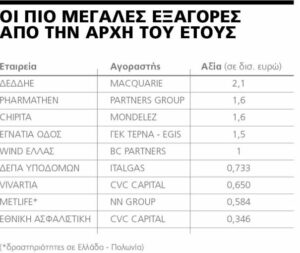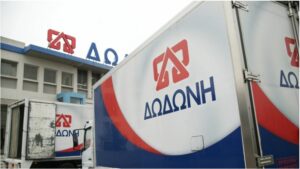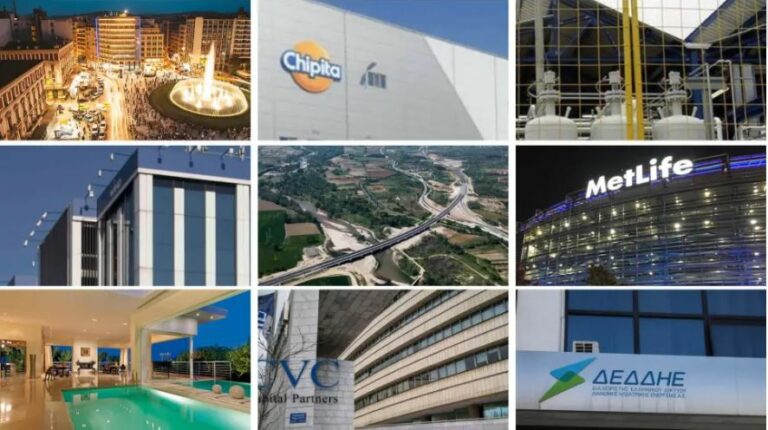Greece’s image as a hub for international investment has changed dramatically over the past 2 years, as foreign capital, wealthy investors, and international private equity funds are finding the country increasingly appealing compared to the past when it was shunned. The country has been experiencing a steady surge in big deals aiding its economy to gain the lost ground of the past, effectively putting it on the map as an attractive prospect for investors to use their funds.
Since the start of the year, business deals have been finalised for the acquisition of companies and concessions of public assets, the valuation of which already exceeds 10 billion euros. This is a record amount, which covers deals such as the sale of 49% of the Hellenic Electricity Distribution Network Operator (HEDNO) to the Macquarie Group from Australia, the acquisition of Chipita by Mondelez International (1.6 billion euros), that of pharmaceutical company Pharmathen by international investment company Partners Group Holding AG, a Swiss-based global private equity firm (1.6 billion euros), the concession of Egnatia Odos to the consortium GEK TERNA – Egis (1.5 billion euros), the acquisition of WIND Hellas by United Group owned by BC Partners (1 billion), the concession of the Public Gas Corporation of Greece (EDEPA) Infrastructure to Italgas (733 million euros) and much more.
In addition to these deals, there have also been significant investments by multinational giants, such as Microsoft to create a data centre hub in Attica, a project worth 400 million euros, Pfizer, Eldorado, Philip Morris, Accor, while the figures increase substantially if we take into account significant investment plans that are currently being implemented by strong domestic players, such as GEK TERNA, Mytilineos, Motor Oil, etc. These impressive deals are the result of a series of factors that came together to work in favor of the country’s economy in its efforts to attract investment capital.

Huge liquidity
As analysts explain, huge liquidity is available worldwide at the moment, as the private equities market has over 1 trillion dollars of unallocated funds looking for … openings. In an international environment of negative interest rates imposed by central banks, the battle to secure positive returns is very fierce. Greece is a market that can offer such returns, as due to the economic and investment cachexia of previous years, the values of domestic assets compared to other markets, if they do not remain lower, often encapsulate greater growth prospects for budding investors.
The European Recovery Fund acts as such a growth accelerator. The 32 billion Euros earmarked for Greece is so pivotal that if used properly by the state and private sector, in combination with the planned reforms, can put the economy on a path of permanent, dynamic, and sustainable growth, offering huge added value to those who are willing to bet on it.
European resources, however, are merely one aspect of success. Foreigners are buying Greece, having ascertained that the country is returning to realism, with a government closer to Europe, which has given priority to modernising the state, complying with fiscal rules, and adopting business-friendly policies. Furthermore, they note the steady improvement of the economic indicators, as reflected in the upgrades of the rating agencies, and the prospects of a country that is a member of the Eurozone, has an oversupply of cheap and well-trained human resources, with many undervalued (due to the ten-year crisis) assets and an abundance of infrastructures for exploitation. There are not many countries in the Eurozone that have Strategic infrastructure of this value (ports, highways, airports, etc.) available to investors and, in some cases, with “monopoly” characteristics, such as HEDNO that attracted the interest of an investor the size of Macquarie.
Prospects
The prospects are already looking favourable. From the TIF, Prime Minister Kyriakos Mitsotakis announced the revision of the growth target for the Greek economy in 2021, from 3.6% to 5.9%. However, this revision may … be updated again, as it is already estimated that GDP growth of more than 7% is a possibility.
All the big global agencies are giving more positive forecasts after the impressive increase of the second quarter by 16.2%. Moody’s Analytics forecasts growth of the Greek economy by 8.2% for 2021, UBS speaks of an increase of 7.9% for the Greek GDP in 2021, Capital Economics at 8.5%, while the National Bank also proceeded with a significant upward revision of its estimate for annual GDP growth to 7.5% for 2021 from a previous estimate of 5.7%.
Meanwhile, the creditworthiness of the Greek economy has been upgraded. The last one was by Scope Ratings, which, although is not among the Big 4 houses, refrains from moving outside the line, making its recent upgrade of Greece by one step, to BB +, with stable prospects, a significant step.
“The Greek economy is recovering from the shock of COVID-19 at a faster pace than expected,” BNP Paribas said a few days ago. The country is lending on the most favourable terms in its history, non-performing loans are falling, the real estate market has been revived (with massive purchases by foreign individuals, in addition to real estate development companies), tourism has performed significantly better than expected, there is a frenzy of hotel buying and selling while the economic climate index has recently reached its highest point in the last twenty years.

Open for business
In order to achieve all this, however, the country was set on sending a timely message to the markets that “Greece is open for business”. One of the primary goals of the government was to move ahead with the large investments and the privatisation program which, admittedly, remained largely mired in the SYRIZA-AN.EL. era due to ideological reasons, reluctance, or simply incompetence.
Once this had been made clear, all the studies show that from the end of 2019 an investment rally in Greece had started, which although abruptly interrupted due to the Covid-19 pandemic, appears on track again, and gaining momentum since the beginning of 2021 resulting in a burst of investment activity associated not only with strategic state investments, but also private ones.
A clear indication of this is recent research of EV (Attractiveness Survey Greece 2021), according to which the country is ranked for the first time in the 8th place among the 10 most attractive destinations for foreign investment, behind countries such as Belgium, the Netherlands, Spain, Italy, Germany, France, and the United Kingdom. The percentage of those who believe Greece is currently implementing a policy that attracts global investors increased for the second consecutive year (71% from 62% in 2020 and 50% in 2019) which shows that the improvement of its appeal is attributed by investors to the pursuit of specific initiatives and reforms and not, as was likely the case in 2019, to the timing and end of a long period of economic and political certainty.
Value investors
All this is indicated in the profile of foreign investors positioning themselves in Greece. In the recent past, the majority of foreign investors in the Stock Exchange and in the part of business agreements were, usually funds with a short divestment horizon. Now, however, well-known financial powerhouses are seeking openings in the Greek market with a long-term horizon and goal of generating value, big players from Europe, America, and, finally, Australia.
The 2.1 billion Euros (in terms of enterprise value) thrown on the table by the energy infrastructure giant Macquarie to buy out a minority (49%) percentage in HEDNO is the largest privatisation ever recorded in the country and at the same time the highest valuation for a minority energy grid package in Europe. The Australian fund outbid very big names, such as CVC Capital, KKR, and First Sentier, who were also invited to submit binding offers.
With the Greek energy market emerging as an investment pole, the recent development for the sale of DEPA Infrastructure to Italgas, which submitted a bid of 733 million euros, is equally important. It is the largest gas distribution company in the neighbouring country and one of the largest in the EU, managing 70,000 kilometres of networks.
The big deals of ’21
Although there is still much to be done, the big deals that have already been recorded since the beginning of the year signal an impressive feat and definitely a change in the business climate for the country.

Το huge 1.6-billion-euro deal multinational giant Mondelez International agreed on for the acquisition of Chipita is still resonating loud in the market. An agreement that significantly reinforced the narrative of a stable Greece, mature enough to welcome serious foreign investment, as it is the largest business acquisition agreement in the Greek food market – but also overall – in recent years.
A global player like Mondelez International, as the snack industry of Kraft Foods, was renamed in 2012, one of the world’s leading companies with net revenue of $ 27 billion by 2020, is a vote of confidence to a group with Greek DNA and presence -directly and through strategic partnerships- in 56 markets. With this move, Mondelez International, listed on NASDAQ, is now gaining an expanded presence in Greece and expects to achieve extensive synergies with its investment in Chipita. The American group is expanding its product portfolio through Chipita and strengthening its leading position in the field of snacks while reinforcing its ties with Greece and having acquired Pavlidis (Lacta, Merenda, Pavlidis chocolates, etc.) for years.
V CVC Capital Partners has developed in the last two years into one of the largest foreign investors operating in the Greek market, with investments of over 1.5 billion euros, but also one of the largest employers, as its staff in companies under its control or it has incested in exceed 11,000. It is one of the largest funds in the world, managing $ 80 billion in assets, and is strategically located in the health, insurance, food, e-commerce, and tourism sectors. In the last three years, V CVC has acquired “Hygeia” hospital, “IASO General” and “Metropolitan”, making the American investment capital one of the strongest players in the field of private health in Greece.

This year the deal of 650 million euros for the acquisition of 100% of Vivartia Holdings stood out, but also the acquisition of 90% of Ethniki Asfalistiki for a price of 346 million euros, with the nominal price for the purchase of 100% of the shares of Ethniki Insurance amounting to 505 million euros.
Especially in the case of Vivartia, CVC acquired the largest food and catering group in the country, now controlling DELTA, Goody’s, Everest, Barba Stathis, Hellenic Dough, Flocafe, etc. CVC’s interest in the industry remains strong, as proved later with the acquisition of a majority stake in the Dodoni dairy a few months ago, at a price that was not announced, but in the market, there was talk of a 100% valuation of the company at 135 million euros.
It should be noted that Dodoni avoided bankruptcy, as it was sold in 2012 by -the then liquidated- Agricultural Bank to private funds, and specifically to SI Foods Ltd, a business investment group in which Lime Capital Partners Ltd. also has a stake. The investment made by the new owner paid off, attracting the interest of the CVC team led by Alex Fotakidis. CVC, at the same time, has acquired a significant minority stake in Skroutz, as well as the e-travel platform, while it has acquired from the Turkish D-Marin, of the Dogus Group, the marinas of Zeas, Lefkada, and Gouvia in Corfu.
Today, CVC Capital Partners is one of the strongest investment groups in the world, with a managed investment portfolio of over $ 160 billion. It manages the funds of more than 300 powerful global investors, while this year it caused a stir with its decision to invest 2.7 billion euros in the Spanish football league, La Liga.

Pharmathen
■ The sale of the pharmaceutical company Pharmathen to the Swiss Partners Group with a valuation of 1.6 billion euros also caused a sensation, among other things, because Pharmathen was acquired by BC Partners (BCP) in 2015 instead of 475 million euros. Nikos Stathopoulos, Managing Director of BCP, recently speaking to newmoney.gr about the sale and the high valuation achieved, stated that the main reason was BCP’s decision to invest in the excellent Research and Development (R&D) Department of the company capital of 250 million euros, an amount particularly high not only for Greece but also internationally. The British fund, which did not receive a single euro dividend from Pharmathen, decided to reinvest them in the R&D and development of the Greek company, resulting in a surplus-value of over 1 billion euros.
Indicative of the important interest that has been expressed in the last two years for Greek assets from foreign investment funds is that for Pharmathen offers were submitted by very large and well-known private equity funds, like Blackstone, Bain Capital, Carlyle, etc. The new owner, Partners Group, based in the Swiss Canton of Zug, currently manages a total of more than $ 120 billion in assets, of which about $ 60 billion is in the private equity sector. It has recently made significant investments in the health sector, amounting to $ 5 billion, with acquisitions of companies such as PCI Pharma Services, EyeCare Partners, Confluent Health, and Wedgewood Pharmacy in the USA.

The acquisition of WIND
The acquisition of WIND Hellas by BC Partners, for nearly 1 billion euros, marked the second big deal completed by the well-known fund in Greece. The addition of Nova, acquired last year and under the umbrella of the United Group controlled by BCP, creates a new telecommunications centre, with a strong base of 924,000 contract mobile customers and 630,000 WIND landline customers with 463,000 customers. Nova TV subscription platform and the company’s 550,000 fixed subscribers. Armed with the offer of integrated packages of fixed and mobile telephony, Internet, and television, the new scheme will aim at a significant increase of its subscription base, implementing new investments in the domestic telecommunications market.
BC Partners, one of the oldest and largest private investment funds in the world, has invested over 4 billion euros in Greece in the last 15 years, and as “THEMA” is in the position to know, will continue its investments. Moreover, a few years ago, Stathopoulos had worked for the acquisition of one of the largest companies in the energy sector in Greece, a deal which, as he has said, for reasons related to timing was not completed. However, BCP is closely monitoring the energy sector not only in Greece but worldwide.

■ Tourism is also attracting many investors, as it is a privileged field for the placement of strong funds in the country. The American investment company Hines acquired last July the hotel complex “Out of the Blue Capsis Elite Resort” in Agia Pelagia of Crete for 125 million euros, making another deal in Greece. Led by Paul Gomopoulos, Senior Managing Director of Hines and head of the company in Greece, proceeded – along with Henderson Park – to acquire the portfolio of the five hotels of the Mamidakis and Kefalogiannis families in Crete for 61 million euros. At the same time, it is also launching a mega residential project of 400 houses in collaboration with Henderson Park in Voula, while it has also acquired the former “Athens Ledra”, now “Grand Hyatt” of Syggrou, and the adjacent building where the “Odeon Star City” operated.
Also, last July, Hotel Investment Partners, the largest owner of hotel units in Southern Europe, owned by Blackstone Investment Fund, signed an agreement to acquire the Elounda Blu hotel unit from Ledra Hotels & Villas.
There were noteworthy deals in the technology and telecommunications sector, such as the acquisition of Lamda Helix by Digital Realty, the agreement for the passive equipment of Vodafone Greece and Wind Hellas mobile phone bases in Vantage Towers, a subsidiary of Vodafone Group, the acquisition of Greek interests Instashop by the German Delivery Hero (it has also acquired e-food), for 330 million euros, Cardlink (Quest) on Worldline, for 93 million euros, but also in foods such as the acquisition of Arivia by Upfield Holdings. In the insurance sector, the deal for Ethniki Asfalistiki, although the largest, is not the only one of 2021. It was preceded by the acquisitions of MetLife activities in Greece and Poland by the NN Group, as well as the Greek subsidiary of the AXA group Insurance from the Italian Generali.

HEDNO’s deal with the largest infrastructure investment group in the world
The largest investment group in the infrastructure sector worldwide is the new minority shareholder of the Hellenic Electricity Distribution Network Operator (HEDNO), with an impressive offer value (enterprise value) of 2.1 billion euros or almost 10 times the business value of operating profits of the company.
Macquarie is one of the 10 largest companies in Australia, listed on the Sydney Stock Exchange with a market capitalisation of 40 billion euros. Founded in 1969, it employs more than 16,000 employees in 32 countries and manages about 400 billion, invested in energy, RES, real estate, banking, telecommunications, and more. It is estimated that about 100 million people use its infrastructure every day.
Among them, 12 million passengers fly through the airports it manages, 34 million passengers use its rail services, 14 million households use electricity and gas and 115 million people use telecommunications infrastructure.
Macquarie first appeared in our country years ago as the owner of the area at the Plato Academy (formerly Mouzaki property) which was intended for commercial activities and was later sold to the American BlackRock and later to Hines. It also participated in the privatisation of Egnatia, but without submitting a binding offer.
Ask me anything
Explore related questions





